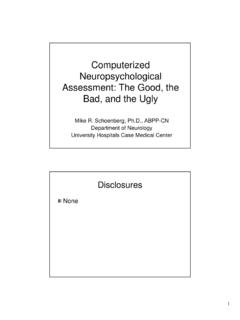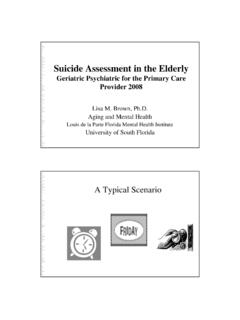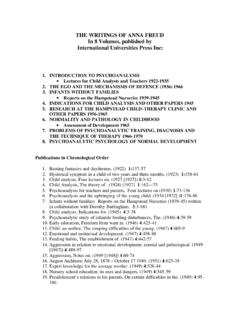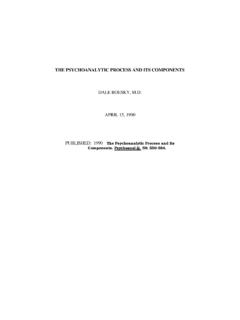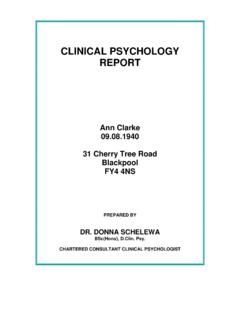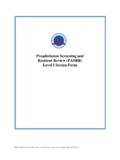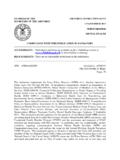Transcription of Age Associated Cognitive Decline and Mild …
1 Age Associated Cognitive Decline and mild Cognitive Impairment (MCI)Mike R. Schoenberg, PhD, ABPP-CNDiplomate, American Board of Clinical NeuropsychologyLicensed PsychologistDepartments of Psychiatry and Behavioral Sciences and NeurologyUniversity of South Florida College of MedicineDisclosuresAdvisory Board/Panel: UCB Pharma, and Co-Editor of Black Book of Neuropsychology: A syndrome based approach Receive financial support from USF and the Florida Alzheimer s Disease Research Center, National Institutes of HealthObjectivesRationale for Neuropsychological AssessmentNeuropsychological Evaluation in Growing Older Age appropriate Decline in Cognitive function Abnormal agingDementias mild Cognitive ImpairmentNeuropsychology Crucial?ConclusionsFuture DirectionsRationale for Neuropsychological AssessmentAging and Brain disorders manifested by changes in Cognitive and behavioral functionDementia is Decline in previously acquired Cognitive and behavioral abilities which leads to deficits in ability to functionMild Cognitive Impairment is abnormal Decline in Cognitive function greater than expected for assessment is only way to measure alterations in Cognitive and behavioral AgingExtensive Data indicate aging is Associated with Cognitive decline292724051015202530 MMSE18-5555-7071-85 Normal AgingWhat, When and How Much Cognitive Decline occurs with aging varies.
2 Numerical ability/arithmetic and processing speed- beginning about age 25 Memory (Episodic or Declarative)- Late 30 s or 40 s perhaps as late as 50 s to 60 s Seattle study found about age 53 Reasoning, verbal ability, and Visuoperceptual skills- Beginning in 50 s and 60 s Word knowledge, vocabulary, word reading-Stable into late adulthood (70 s+)Longitudinal change in cognition with normal agingFrom Schaie (1996) Cognitive Changes in Normal Aging:Simple Attention and Complex AttentionAttention: Simple TaskAttention / Processing Speed: Difficult TaskCognitive Changes in Normal AgingLanguageObject naming: Easy ItemObject Naming: Difficult ItemCognitive Changes in Normal AgingMemoryVerbal MemoryBatCannonChairFloorOrangeMayorBusP layCornerSaladLeverSquareVisual (non-verbal) memoryCognitive Changes in Normal Aging:Visuoperceptual/Visual Reasoning012345678910 Score60708090 AgeSpatial Pe rce ptionVis ualReasoningVisuospatial Perception:Spatial PerceptionCognitive Changes in Normal Aging:Reasoning012345678910 Score60708090 AgeVe rbalReasoningVis ualReasoningVerbal ReasoningEasywWood and Coal HardwPlatypus and StorkObjectivesNeuropsychological EvaluationRationale of AssessmentNeuropsychological Evaluation in Growing Older Age appropriate Decline in Cognitive function Abnormal agingDementias mild Cognitive ImpairmentNeuropsychology Crucial?
3 ConclusionsFuture DirectionsCognitive Decline : Dementia and mild Cognitive ImpairmentExtensive terms and research to defining where normal aging stops and pathology beginsAge-appropriate memory Impairment (AAMI)SenilityBenign semnescent forgetfulnessCognitive Impairment No Dementia (Canada) mild Cognitive DisorderMild Cognitive Impairment (MCI) mild Neurocognitive DisorderQuestionable dementiaDefining Impairment Theoretical Progression from normal to dementiaFrom Petersen, 2003 Gross Pathology: Normal Coronal ViewGross Pathology: Alzheimer s DiseaseHow to define where pathology begins?Defining Impairment:DementiaDementia is broadly defined as a Decline in Cognitive function from a previous level of ability severe enough to interfere with work, school, social activities, etc. that is not due to delirium or encephalopathyDSM-IV TR defines dementia more specifically as requiring a deficit in memory and at least one other Cognitive , Aphasia, Agnosia, Apraxias, executive functionsANDI mpairment in ability to work, attend school, complete ADLs, to measure memory loss and Cognitive or behavioral impairmentIdentifying Cognitive ImpairmentMethods to define impairment in neuropsychological function for dx of dementiaClinical interview with pt (and collateral source)MMSEC linical Dementia Rating scale (CDR)Neurologic/neurobehavioral examClinical neuropsychological evaluationStructure of CNS does NOT allow for dx of dementiaMRI, CT, PET study can NOT identify Cognitive impairment for dx of dementiaWhen is Impaired Actually ImpairedThreshold for impairment can vary from diagnostician to diagnosticianWhen is MMSE score impaired?
4 MMSE score 25/30?MMSE score 23/30?MMSE score 18/30?Neuropsychological criteria for defining impairment< 16thpercentile (< SD below average = possible impairment)< 7thPercentile (< SD below average = MCI)2ndPercentile (< SD below average = dementia)Neuropsychologic Profile of DementiasSo-called cortical dementiasMemory loss (impaired recall without benefit of recognition cues) with other cortical findings such as agnosias, aphasias, and/or is Dementia of Alzheimer s typeSo-called subcortical dementiasslowed processing speed, with deficits in attention, memory (poor spontaneous retrieval but intact recognition), visuospatial skills, and executive functions (initiation, planning, behavioral apathy).Prototype is Vascular dementia or Parkinson s disease dementiaAlzheimer s DiseaseEarly deficitsEarly and profound impairment in memoryDeficient consolidation and rapid forgettingRetention rate over 20-30 minutes < 50 %Attention/working memory intactSocial withdraw (common early)Verbal fluency (semantic < phonemic) and dysnomiaVisuoconstructional apraxiaExecutive function (impulsivity, indifference, poor insight)Later stage deficitsIQ, attention, behavioral apathy, agitation, delusionsVascular DementiaEarly deficitsMemory impairedPoor spontaneous recall, but recognition intactAttention (divided attention/working memory)Visuoperceptual/Visuoconstructional apraxiaExecutive function (reasoning, sequencing, apathy)Verbal fluency (semantic > phonemic)
5 Social withdraw, depressionFocal neurological deficitsLater stage deficitsIQ, agitation, delusionsLewy Body DementiaEarly deficitsEarly and profound impairment in AttentionImmediate memory/working memory impairedVisuoperceptual/Visuoconstructio nal apraxiaExecutive function (reasoning, sequencing, poor insight)Fluctuating mental status, visual hallucinationsMemory not severely impairedLater deficitsMemory, IQ, language/speech, agitation, delusionsFrontotemporal DementiaEarly deficits (considerable variability)Executive function (impulsivity, reasoning, sequencing, apathy, disinhibition, poor insight)Behavioral/Mood (Early and profound changes)Attention (divided attention/working memory)Verbal fluency (phonemic < semantic) naming deficitsPrimary progressive aphasias have early and profound language deficitsMemory ( mild deficits only)Later deficitsMemory, IQ, visuoperceptual, agitation, echolalia, mutism, stimulus bound behaviorsObjectivesNeuropsychological EvaluationRationale of AssessmentNeuropsychological Evaluation in Growing Older Age appropriate Decline in Cognitive function Abnormal agingDementiasMild Cognitive ImpairmentNeuropsychology Crucial?
6 ConclusionsFuture DirectionsMild Cognitive Impairment (MCI)Term to describe Pts with Cognitive impairment, but do NOT meet diagnostic criteria for dementiaPeterson et al. (Mayo Clinic) defined MCI as: Subjective memory complaint Objective memory deficit compared to age-matched peers ( or more standard deviations below average) Otherwise cognitively intact Otherwise intact daily functioning- Patient may use adaptations for memory loss Not dementedWho Cares? Why MCI is ImportantEarliest cut-point distinguishing normal aging from abnormal aging Controversy Unique disease entity? OR Prodromal state representing initial stages of disease?MCI increases risk to develop dementia Annual progression of healthy community living older adults (aged 55+) to dementia is about 1-2 % per year Annual progression from MCI to dementia is 10-15% MCI first clinical point to initiate treatment?Theoretical benefit for various rates of early detectionTime of treatment exposureNeuropsychologic EvaluationMMSE EvaluationFrom Petersen, 2003Tx benefitAdvances: Diagnostic CriteriaDropped need for subjective memory complaintDifferent measures and cut-offs Original required only one measure within a domain to be < SD below peers ( , if one of 2 memory scores < SD = MCI) comprehensive require 2 (or more) measures within a domain to be < SD below peers liberal require only one score fall < SD below peers conservative requires 2 (or +) measures within a domain < SD below peersAdvances: Diagnostic SubtypesSingle Domain MCI Amnestic MCI (aMCI-s) The original with memory < SD below demographically-matched peers.
7 Non-amnestic MCI (naMCI-s) Non-memory domain ( , language, attention, etc.) < SD below Domain MCI Multidomain amnestic MCI (aMCI-m) Memory + another domain < SD below peers Multidomain nonamnestic MCI (naMCI-m)2 or more nonmemory domain < SD below peersWhy MCI Subtype Important?Predict Different Dementias?Each dementia may have distinct MCI: aMCI-sAD aMCI-mAD or Vacular dementia (VaD) naMCI-sFTD or Lewy Body dementia (DLB) naMCI-mVaD or DLBE arly data: MCI subtypes notconsistent conversion to distinct dementias, BUTaMCI-s and multiple domain MCI greater risk for ADProgression of AgingFisher et al., Neurology 2007;68: 288-291 Healthy273 (70%) healthy34 (9%) naMCI9 (2%) aMCI49 (13%) AD25 (6%) mortalityAmnestic MCI Healthy = 15% Dementia = 49%Non-amnestic MCI Healthy = 24% Dementia = 27%Progression Rate:MCI to _____Dementia Annual conversion rates Low = 2 % per year High = 31 % per year Mean = 10-15 % per yearCognitively Healthy (revert to healthy status) Study period ( to 6 years) Low = 15 % High = 44 % Annual conversion rateMean = 8-11 % per yearConversion Rate: MCI subtypesBusse et al.
8 Neurology 2006; 67: 2176-2185 Dementia aMCI-m=60% naMCI-m=60% naMCI-s= Healthy naMCI-s= naMCI-m=0%MCI and Dementia: Risks and Protective FactorsProgression to Dementia less likely if Non-amnestic MCI-single domain (naMCI-s) Minimal cerebrovascular disease No stroke, diabetes, heart disease, smoking, HTN, hyperlipdemia mild to moderate ETOH intake Exercise High Cognitive reserve May account for lack of association between severity of brain pathology and clinical symptoms High academic achievement, premorbid IQ, occupational attainment, leisure activities No psychiatric symptoms (anxiety, amotivation, or depression)When to Refer for Neuropsychologic Evaluation?Assessment of neuropsychological function crucial for diagnosis and management of dementias and MCI However, assessment sensitivity and specificity needs vary depending upon issueTo distinguish patient neuropsychological function as normal or grossly abnormal, clinical neuropsychologic eval. Crucial?Detailed neuropsychologic eval assists: Differential diagnosisDementia vs.
9 PseudodementiaDifferential diagnosis of dementiasIdentify subtypes of MCI Amnestic MCI versus non-amnestic MCI Treatment planningAllow early detection to start treatment Different dementia/MCI subtypes may = different txMonitor treatment effectiveness of Cognitive deficitsDetermining care needs (placement) Determining competency/functional capacityBottom LineDistinguishing normal aging from abnormal is complex Inter-individual variations in normal agingCognitive progression within neuropsychological domains occurs at different rates Processing speed and reaction time Decline first Language (word knowledge, reading) most resillantCognitive progression likely affected by numerous biological and environmental variables Intra-individual variability in Cognitive functions important to consider30 % of individuals will have a score < 5th%ile on comprehensive neuropsychological evaluation. Criteria used to distinguish normal aging from abnormal aging better identifiedCommon standard is MCIB ottom LineMCI useful diagnosis Often used criteria to Diagnose MCIS core on neuropsychological measure < SD below the mean of healthy peers Increases likelihood of progression dementia10-15 % progress from MCI to dementia per year Subtypes of MCI proposedAmnestic MCI (single or multiple domain)Non-amnestic MCI (single or multiple domain) MCI represents early clinical point to start treatmentIncrease exposure/power of any intervention?
10 QuestionsCognitive function varies within individualsPercent of healthy individuals with at least one memory score < 5th%ileDefining Cognitive Impairment: DementiasNeuropsychological deficits should follow known neuropathological disease patterns Distinguish pseudodementia from dementiasNeuropsychological deficits vary between dementias AD has more profound memory deficits than FrontotemporaldementiaWithin a dementia syndrome, considerable inter-individual variability One pt with AD may exhibit more language dysfunction while another may exhibit more visuospatial deficitsNormal AgingAverage MMSE score by age292724051015202530 MMSE18-5555-7071-85 Parkinson s Disease DementiaEarly deficitsInformation processing/Psychomotor speedExecutive function (reasoning, sequencing, apathy, disinhibition)Attention (divided attention/working memory)Visuoperceptual/visuoconstruction alVerbal fluency (phonemic < semantic) and naming deficits. Hypophonia, micrographia, (poor spontaneous recall, intact recognition)Later deficitsMemory, IQ, attention (basic)ObjectivesNeuropsychological EvaluationRationale of AssessmentNeuropsychological Evaluation in Growing Older Age appropriate Decline in Cognitive function Abnormal agingDementias mild Cognitive ImpairmentNeuropsychology Crucial?
